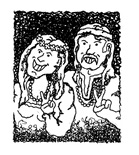
Back to the Sixties?
LETTERS FROM ENGLAND
England is currently in the throes of nostalgia: A 1960s revival is in progress. The precipitating factor seems to be the realization that a full generation has now passed since that decade of flower-power, Carnaby Street sidewalk artists, and belief that a new era of “love, not war” was just around the corner. On a deeper level, current criticism of national institutions (the monarchy, the criminal justice system, the established Church) has left in its wake a longing to recover a time of (supposed) innocence, freedom, and idealism.
For two nights — April 15 and 16, 1994 — the Royal Albert Hall was packed to the rafters (or, rather, the dome) for the 25th-anniversary concerts of The Seekers, an Australian singing group who at one point in the 1960s outsold the Beatles with their moving renditions of such songs of love and hope as “Morningtown Ride” (a lullaby of safety and security), “A World of Our Own” (the dream of a couple’s love rendering everything else unreab| and “Turn, Turn, Turn” (the lyrics consisting entirely of the text of Ecclesiastes 3:1-8). The concerts attracted both the man on the Clapham omnibus and show-business luminaries. Alan Jackson concluded his review in The Times: “The resultant whole whipped a delirious audience into a frenzy of community singing and unbridled nostalgia. Niceness with knobs on, and absolutely nothing wrong with that.” I couldn’t agree more: The evening brought tears to the eyes of this hard-bitten barrister.
But there was far more to the 1960s than The Seekers. In 1963 the Profumo scandal rocked England to the core. John Profumo, then-Minister of War in the Macmillan government became involved in an adulterous affair with party girl Christine Keeler, whom he had met through Stephen Ward, a dissolute London osteopath and sycophant to those in positions of power. Miss Keeler later declared that she was also sleeping with a Captain Ivanov, the Russian Naval Attaché. When the sordid mess became public, Ward was prosecuted for living off immoral earnings, and committed suicide; Profumo resigned in disgrace; and the affair was one of the chief factors that led to the fall of Macmillan’s Tory government, in spite of a sober report by eminent judge Lord Denning, which showed that national security had not been imperiled (the report sold 4,000 copies the first hour of its publication!). The nation was both attracted and repelled by the hedonism of those involved. The 30th anniversary of the trial of Stephen Ward has brought forth a photolithographic reprint of Denning’s report, a full-length, meticulously researched movie on the scandal, and even a Times obituary of Captain Ivanov, who recently died of alcoholism in Moscow.
One of the classic scholarly evaluations of the period has also been reprinted, Christopher Booker’s The Neophiliacs. The Revolution in English Life in the Fifties and Sixties. This careful analysis, when originally published, was hailed by Malcolm Muggeridge as “a remarkable book…enormously stimulating, readable and perceptive.” Booker’s thesis is that in essence the 1960s replaced reality with fantasy: The spirit of the times was to give up belief in a settled order of things — what Lovejoy called “the great chain of being” — and to think seriously that everything (morals, society) could be built de novo. Thus, the characteristic naïveté and experimentation with alternative lifestyles (the LSD culture, etc.) that typified the decade.
You May Also Enjoy
Without a vision, the people perish, and the only proper and lasting vision for individual or corporate life is that of the Christ of Scripture.
“Priests and bishops and popes are usually good men, often very good men. But they’re still only men, not always capable of really heroic courage," said the theologian.
In March I flew across the pond to deliver a guest lecture in the 24th…

